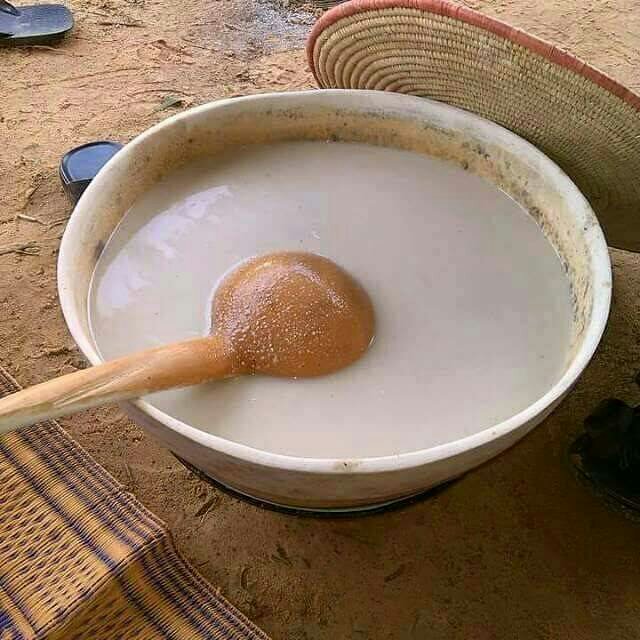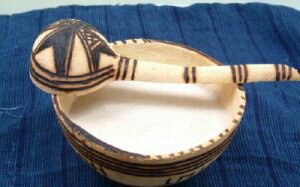Fura da nono is a popular African cold gruel produced and consumed mostly in the northern part of Nigeria. The meaning of Fura da nunu in English is simply milk and millet gruel. Fura da Nono is a very healthy and satisfying food. Nono (or Nunu) is a local yogurt with thick lumps produced from the fermentation of cow milk. Nono is obtained from fermented cow milk after the separation of the milk from its lipid component known as man shanu (cow oil).

The art of nono production is one of the many unique traditions the Fulanis have preserved for centuries. During the day, it is common to see young Fulani ladies hawking this special drink from place to place in local wooden bowls which they carry on their heads.
Below is an explanation of the preparation of fura da nono.
INGREDIENTS
•Cup millet or Guinea corn meal
•Soya bean meal
•Dried pepper (ground)
•Cloves (ground)
•Dried ginger root (ground)
•Corn flour
•2 litres water (For boiling)
•1 litres Fresh cow milk yogurt “No-no” or Normal yogurt
•Granulated sugar to taste
PROCEDURE
•Mix the dry flour ingredients and spices together in a bowl.
•Make a well in the centre and add a little water just enough to act as a binding agent for the dry ingredients.
•Mould into medium sized balls.
•Heat the water for about 7mins and when it starts to boil, drop the moulded balls into the water and leave to boil for about 20 minutes.
•Transfer the boiled balls from the pot into a mortar and pound thoroughly.
•Re-mould once more into small balls and sprinkle with corn flour to keep the balls moist
•To serve, pour the nono into a bowl.
•Add the balls (mashed) and sugar to taste.

Some Health Benefits of Fura da Nono
1. Millet can help reduce the effects of migraines and heart attacks due to the presence of magnesium.
2. Millet helps in fat metabolism, repair of body tissue and creating energy in the body due to the presence of phosphorus in the crop.
3. Millet helps in the lowering of cholesterol in the body (Vitamin B3).
4. Millet helps reduce the risk of having type 2 diabetes.
5. Millets helps to protect against breast cancer and also protect against childhood asthma.
6. Nunu Yogurt contains power-boosting protein and bone-building calcium.
7. Yogurt such as nono can give you flat abs. according to research conducted by the University of Tennessee, Knoxville.
8. The Alkaline nature of Fura de nunu helps to promote digestion and prevents constipation.
9. Nono Yogurt is an excellent probiotic which helps do away with harmful microorganisms that can cause intestinal infections
10. It produces serotonin which helps to calm and soothe our moods.
Why don’t you try to produce this drink at home and give your family a wonderful time savouring it?





